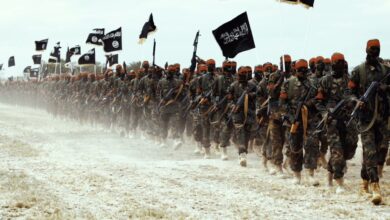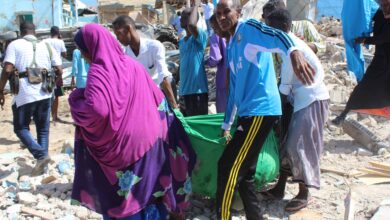
Since his election in 2017, Somalian President Mohamed Abdullahi Mohamed “Farmaajo” (of the Darod/Marehan clan) has increasingly politicized his security agencies. While changeovers within the security agencies have accompanied every recent presidential election in Somalia, the extent to which Faarmajo has used such transitions to throttle opposition is unprecedented.
By contrast, fighting the al-Shabaab Islamic militant insurgents has frequently been a second priority. After fighting in the capital Mogadishu in April 2021, discussions started over a rebalancing of security agency heads to better guarantee peaceful elections.
Those discussions appear to have withered but should be restarted. If they are not, it will threaten peaceful elections and any potential transition after that.
Changing Somalia’s Military Leaders
A change of military leaders has followed every recent presidential transition, but the current administration has taken this trend to the extreme.
After new presidents came into office in 2009 and 2012, the Chief of Defence Force was replaced. Yet, in the two years after Faarmajo came to office, he replaced his Chief of Defence Force four times, rewarding political loyalty at the expense of experience and competence.
In August 2019, a 32-year-old officer was appointed. This latest chief was promoted straight from lieutenant colonel to brigadier, bypassing the rank of colonel. In contrast, a 32-year-old officer in the British Army might be a captain or a major.

Increasing Control Over the Armed Forces
Another tool the current leadership employs to increase personal and political control over the armed forces is that of downgrading the authority and influence held by heads of the various military services.
Almost invariably, armed forces headquarters have senior generals who direct operations, intelligence, personnel, and other staff branches. When the current administration arrived, these posts in the Somali National Army headquarters were held, in the main, by Siad Barre-era (president from 1969 to 1991) “old soldiers” associated with the military for over 35 years.
Faarmajo first appointed a batch of veteran Barre-era officers who were more reflective of his clan outlook. However, he later removed most of them, replacing colonels and brigadier generals with captains. This was done to ensure that army officials would not hinder directives that came from the president’s office.
From 2017 onwards, in addition to personnel changes, senior government leadership began subverting the authority of senior commanders to take direct control of the army. This marginalized army headquarters, and made even the most professional military leadership reliant on personal political ties with the president and senior advisors.
From late 2018, this marginalization of commanders was employed in conjunction with the newly established “Haram’aad” (Cheetah) paramilitary police unit to undermine regional Federal Member State governments.
The aim was to install compliant regional governments that back President Faarmajo and his close confidants for re-election. The same mechanisms were then used to attack opposition presidential candidates ahead of planned demonstrations in February this year.
Fighting in Mogadishu
When President Faarmajo arranged for the parliamentary lower house to approve a two-year extension of his term in mid-April, it triggered clashes between security forces loyal to the president and opposition fighters.
Army and police Hawiye clan fighters began to desert their posts and gather in Mogadishu. Abgaal fighters abandoned their posts in Middle Shabelle while Habar Gedir gathered in the Mogadishu suburb of Shirkole. The Murusade rallied their clansmen from the army and police in the Mogadishu suburb of Daynille.
DEVELOPING: Civilians start fleeing #Mogadishu as fighting erupts in the capital Mogadishu.@ItsMutai @HarunMaruf @geraldbitok pic.twitter.com/cn63Vk5C9z
— Hon Abdimajid Hussein (@HonAbdimajid) April 25, 2021
Fighting began on Sunday, April 25, but quickly died down. The Turkish-trained “Gorgor” soldiers, a multi-clan force with many loyal to Faarmajo, seemingly balked at fighting other parts of the Somali National Army.
As a result, Faarmajo and his closest supporters had few remaining loyal fighting forces and lost significant territory to the opposition. In some places, opposition fighters were no more than hundreds of meters from the presidential palace. Senior politicians managed to quell the fighting by Monday morning.
A week and a half later, it was announced that Prime Minister Ahmed Roble would take over the electoral process, to remove the responsibility from President Faarmajo.
Empty Promises?
Three days later, on May 8, discussions were underway about changing key personnel within the army and police. This would have demonstrated that the president and his advisors were serious about lifting the threat of military force to influence any upcoming elections.
Among the changes discussed were the posts of Chief of Defence Force, Land Force Commander, head of military intelligence, the brigade commander of the Turkish-trained “Gorgor,” and the “Haram’aad” police commander.
If such command changes had taken place, Somali security forces would have turned over a new leaf. However, little actual change occurred.
Somali Military and Security Chiefs Must Be Replaced
Instead, on May 27, a fresh agreement on national elections was signed between the government and opposition, aiming for elections within 60 days. The timetable is unrealistic. Months more may be necessary.
Furthermore, the agreement was not accompanied by any significant replacements of military heads. Changing at least some of the security chiefs would be an important sign of good faith. It might even be one of the most significant moves that could guarantee a peaceful, calm, and fair electoral process.
To better guarantee free and fair elections, at least some military and security chiefs must be replaced.
 Dr. Colin D. Robinson is a Senior Researcher with the African Research Institute at Óbuda University in Budapest. He spent much of 2017-2020 on a European Union contract analyzing and reporting on military forces in southern Somalia. He previously worked for the New Zealand Defence Force and the United Nations.
Dr. Colin D. Robinson is a Senior Researcher with the African Research Institute at Óbuda University in Budapest. He spent much of 2017-2020 on a European Union contract analyzing and reporting on military forces in southern Somalia. He previously worked for the New Zealand Defence Force and the United Nations.
The views and opinions expressed here are those of the author and do not necessarily reflect the editorial position of The Defense Post.
The Defense Post aims to publish a wide range of high-quality opinion and analysis from a diverse array of people – do you want to send us yours? Click here to submit an op-ed.











